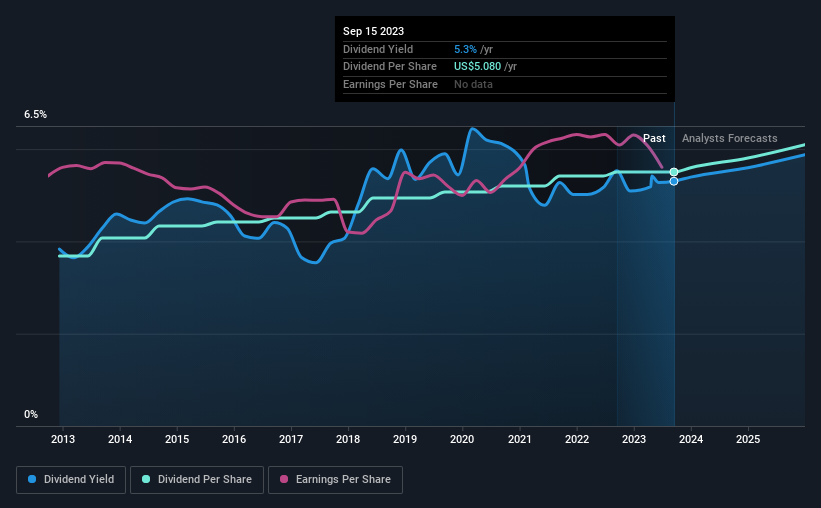- United States
- /
- Tobacco
- /
- NYSE:PM
Philip Morris International's (NYSE:PM) Upcoming Dividend Will Be Larger Than Last Year's

The board of Philip Morris International Inc. (NYSE:PM) has announced that the dividend on 12th of October will be increased to $1.30, which will be 2.4% higher than last year's payment of $1.27 which covered the same period. Based on this payment, the dividend yield for the company will be 5.3%, which is fairly typical for the industry.
View our latest analysis for Philip Morris International
Philip Morris International's Payment Has Solid Earnings Coverage
While it is always good to see a solid dividend yield, we should also consider whether the payment is feasible. Before making this announcement, the company's dividend was much higher than its earnings. This situation certainly isn't ideal, and could place significant strain on the balance sheet if it continues.
Over the next year, EPS is forecast to expand by 47.4%. Assuming the dividend continues along the course it has been charting recently, our estimates show the payout ratio being 70% which brings it into quite a comfortable range.

Philip Morris International Has A Solid Track Record
The company has an extended history of paying stable dividends. The annual payment during the last 10 years was $3.40 in 2013, and the most recent fiscal year payment was $5.08. This means that it has been growing its distributions at 4.1% per annum over that time. While the consistency in the dividend payments is impressive, we think the relatively slow rate of growth is less attractive.
Dividend Growth May Be Hard To Achieve
The company's investors will be pleased to have been receiving dividend income for some time. Earnings have grown at around 4.6% a year for the past five years, which isn't massive but still better than seeing them shrink. The earnings growth is anaemic, and the company is paying out 98% of its profit. As they say in finance, 'past performance is not indicative of future performance', but we are not confident a company with limited earnings growth and a high payout ratio will be a star dividend-payer over the next decade.
Philip Morris International's Dividend Doesn't Look Sustainable
Overall, we always like to see the dividend being raised, but we don't think Philip Morris International will make a great income stock. We can't deny that the payments have been very stable, but we are a little bit worried about the very high payout ratio. We would probably look elsewhere for an income investment.
It's important to note that companies having a consistent dividend policy will generate greater investor confidence than those having an erratic one. At the same time, there are other factors our readers should be conscious of before pouring capital into a stock. Taking the debate a bit further, we've identified 2 warning signs for Philip Morris International that investors need to be conscious of moving forward. Is Philip Morris International not quite the opportunity you were looking for? Why not check out our selection of top dividend stocks.
New: Manage All Your Stock Portfolios in One Place
We've created the ultimate portfolio companion for stock investors, and it's free.
• Connect an unlimited number of Portfolios and see your total in one currency
• Be alerted to new Warning Signs or Risks via email or mobile
• Track the Fair Value of your stocks
Have feedback on this article? Concerned about the content? Get in touch with us directly. Alternatively, email editorial-team (at) simplywallst.com.
This article by Simply Wall St is general in nature. We provide commentary based on historical data and analyst forecasts only using an unbiased methodology and our articles are not intended to be financial advice. It does not constitute a recommendation to buy or sell any stock, and does not take account of your objectives, or your financial situation. We aim to bring you long-term focused analysis driven by fundamental data. Note that our analysis may not factor in the latest price-sensitive company announcements or qualitative material. Simply Wall St has no position in any stocks mentioned.
About NYSE:PM
Philip Morris International
Operates as a tobacco company working to delivers a smoke-free future and evolving portfolio for the long-term to include products outside of the tobacco and nicotine sector.
Solid track record established dividend payer.


